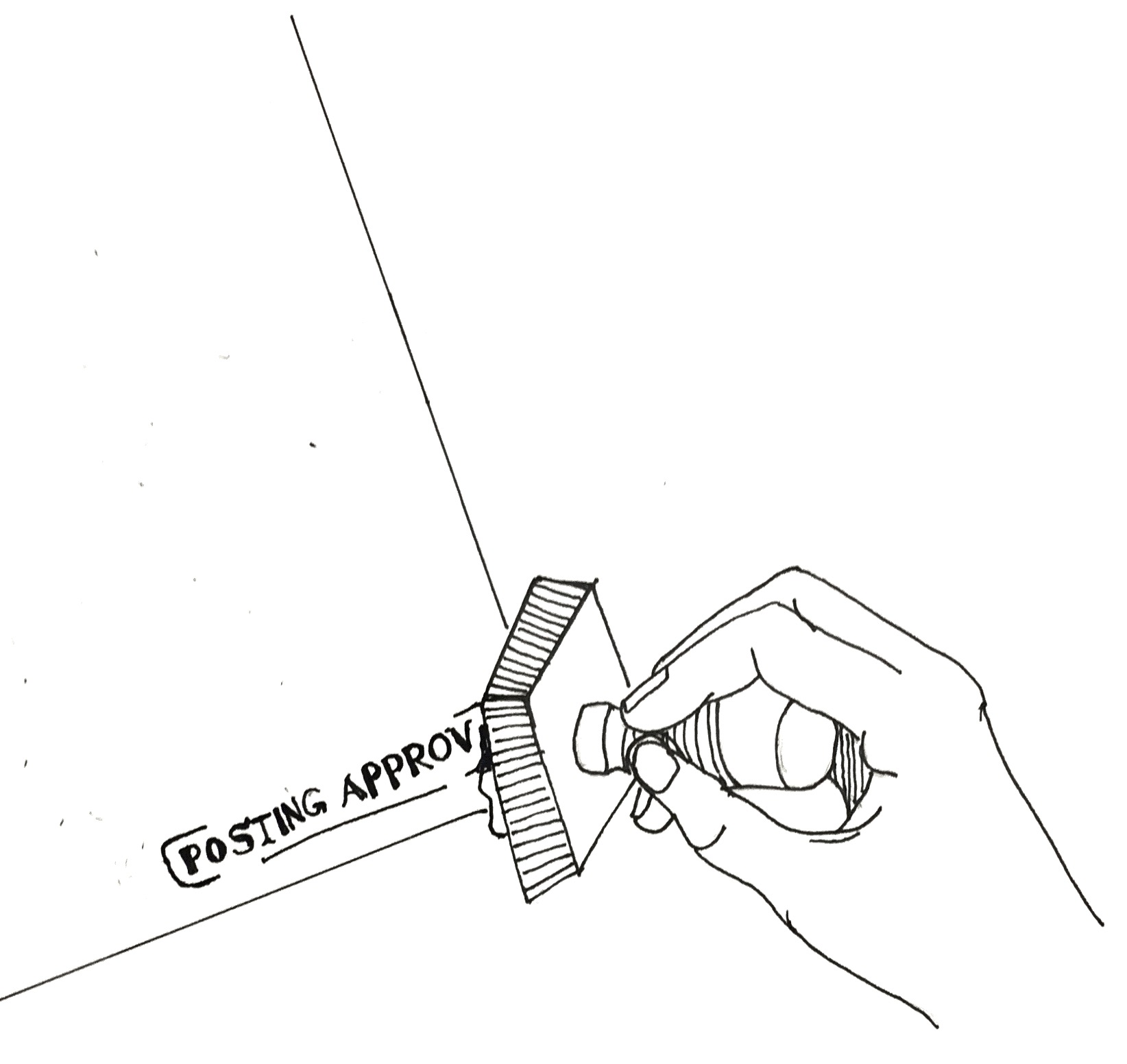
POSTERS ARE ubiquitous on Lewis & Clark’s campus, from academic and faculty buildings like Templeton and Miller to residential halls. In most buildings, the Student Life Publicity Procedures and Freedom of Expression & Academic Inquiry Policy rules applied, which state that a poster must be a certain size, have the name of a LC sponsor on it, include a date and contact information, as well as be posted in a certain way and taken down by a specific date. However, this fall, a change was made in the posting procedure for Templeton. Now, anyone who wishes to put up a poster in Templeton must get a stamped approval from Student Activities. Charlie Ahlquist, Director of Student Rights and Responsibilities, explained the reasoning behind the new policy.
“Our bulletin boards and halls have been inundated with out-of-date posts, off-campus advertisements and many other distractions which take up space in the visual landscape,” Ahlquist said. “As a result, LC community members stop paying attention to printed publicity. This means the publicity that student organizations and departments spend money and time developing are not yielding the attention they desire. This is a sustainability issue as well, as many organizations solve this problem by printing additional publicity, wasting materials and adding further visual noise. We wanted to develop a procedure to regulate print publicity so that recognized student organizations and LC departments get priority and are more effective in their promotional activities.”
Jason Feiner, Director of Student Activities, had the opportunity to give feedback on the proposal before it was adopted.
“The policy and procedure promote compliance with established fire codes, help reduce paper waste[,] prevent damage to surfaces and costly
cleanup and repairs and provide clarity about outside vendors who want to post advertisements on campus,” Feiner said.
Ahlquist said that Dean of Students Anna Gonzalez reached out to a group of people for help remedying the situation, including Ahlquist, Cathy Busha, Sharon Sexton and Sandi Bottemiller. The Dean of Students’ Leadership Team approved and adopted the policy.
Though there had been specifications about what posters had to include, Feiner mentioned that there wasn’t any vetting process before the new policy was put in place.
“The boards were in a constant state of disarray with people posting over one another, and as a result everyone’s message got lost in the clutter,” Feiner said.
With the new policy, anyone who wants to post a poster must to go Student Activities to have the poster reviewed and then stamped. Feiner said that the process had been lengthened because of this extra step, but not by much.
“The new vetting process is simple and in place to double check that posters cover the basics,” Feiner said. “It only takes a minute or so.”
“This step will yield greater efficacy from our publicity,” Ahlquist said.
ASLC Vice President Nick LeSage ’17 voiced reservations about the policy.
“I am in general agreement with the new posting policy’s aims, but I have reservations about its enforcement mechanisms,” LeSage said. “I fully understand the reasons provided for the new posting procedures, and agree that they are very reasonable goals. I also understand that it is well within the college’s rights and abilities to regulate postings. However, I am concerned by the enforcement procedure, particularly for postings in Templeton, in that they must be ‘cleared’ or pre-approved. While I am certain there is no censorial intent behind the procedure, there is censorial potential. This is particularly true if only a singular person, regardless of who that person is, gets carte blanche to decide what does and does not meet standards.”
He went on to explain that some individuals and groups that “wish to circulate potentially contentious information or that have been critical of school administration in the past” may feel deterred from posting notices or posters, or may be prohibited from doing so. He added that he did not believe the intent is malicious, but it could act as a deterrent for students.
As for the effect on student groups, both Feiner and Ahlquist said that they did not anticipate negative outcomes.
“I do not foresee this having any effect on anyone wanting to promote their events,” Feiner said. “Those who want to promote their events just need to plan in advance to get their publicity materials checked and stamped.”
“This will add a step that recognized student organizations will need to take before they post their publicity,” Ahlquist said. “It will also increase the likelihood that their publicity is seen, as publicity which is out of date or does not comply with the procedures will be taken down.”
LeSage said that he remained skeptical of the policy’s stated intent to ensure that posters are posted using the proper adhesive or comply with the fire code.
“Enforcement of such objectives will require active inspection of materials already posted,” LeSage said. “Prior approval only has a genuine relationship to content-specific goals, such as ensuring that the posted materials comply with the Code of Conduct.”
LeSage offered up his own idea for how the policy can reduce any possibility of bias or censorship.
“I would feel far more comfortable if I knew there were multiple people, preferably a student as well as a staff member, who were able to independently grant approval for posting,” LeSage said. “Having multiple approval authorities ensures that no one individual is able to fully control the content of postings based on personal biases.”
Subscribe to the Mossy Log Newsletter
Stay up to date with the goings-on at Lewis & Clark! Get the top stories or your favorite section delivered to your inbox whenever we release a new issue.

Leave a Reply